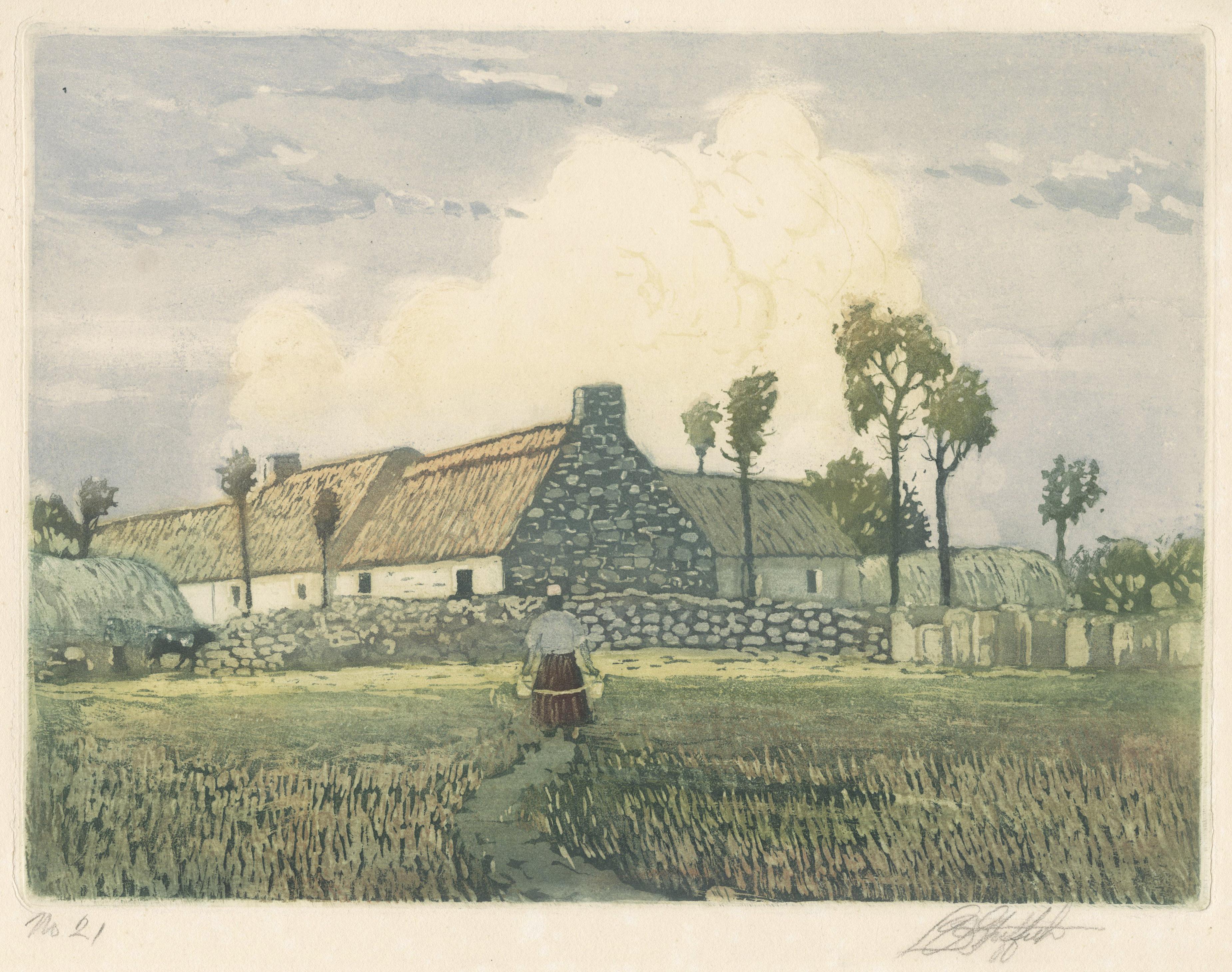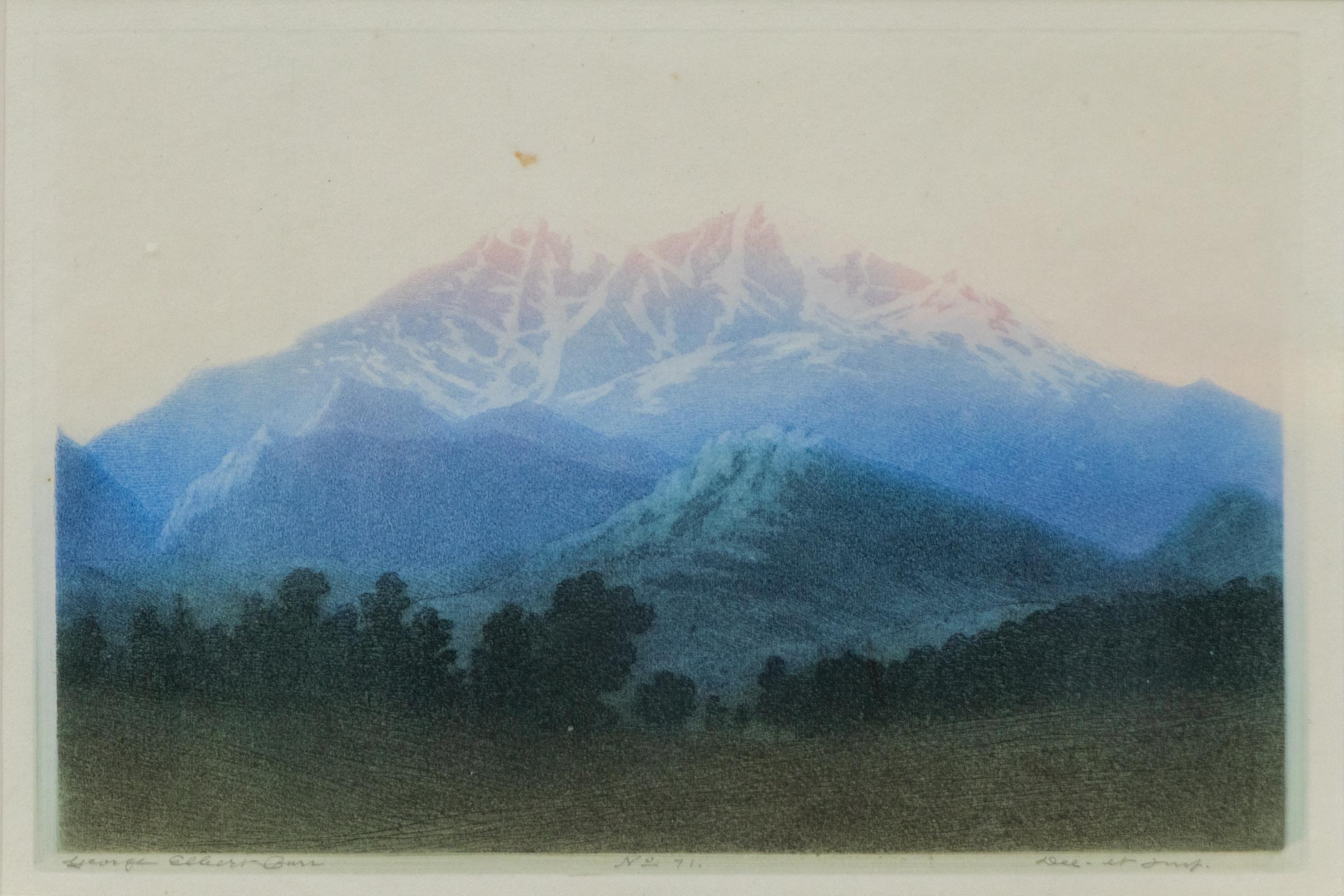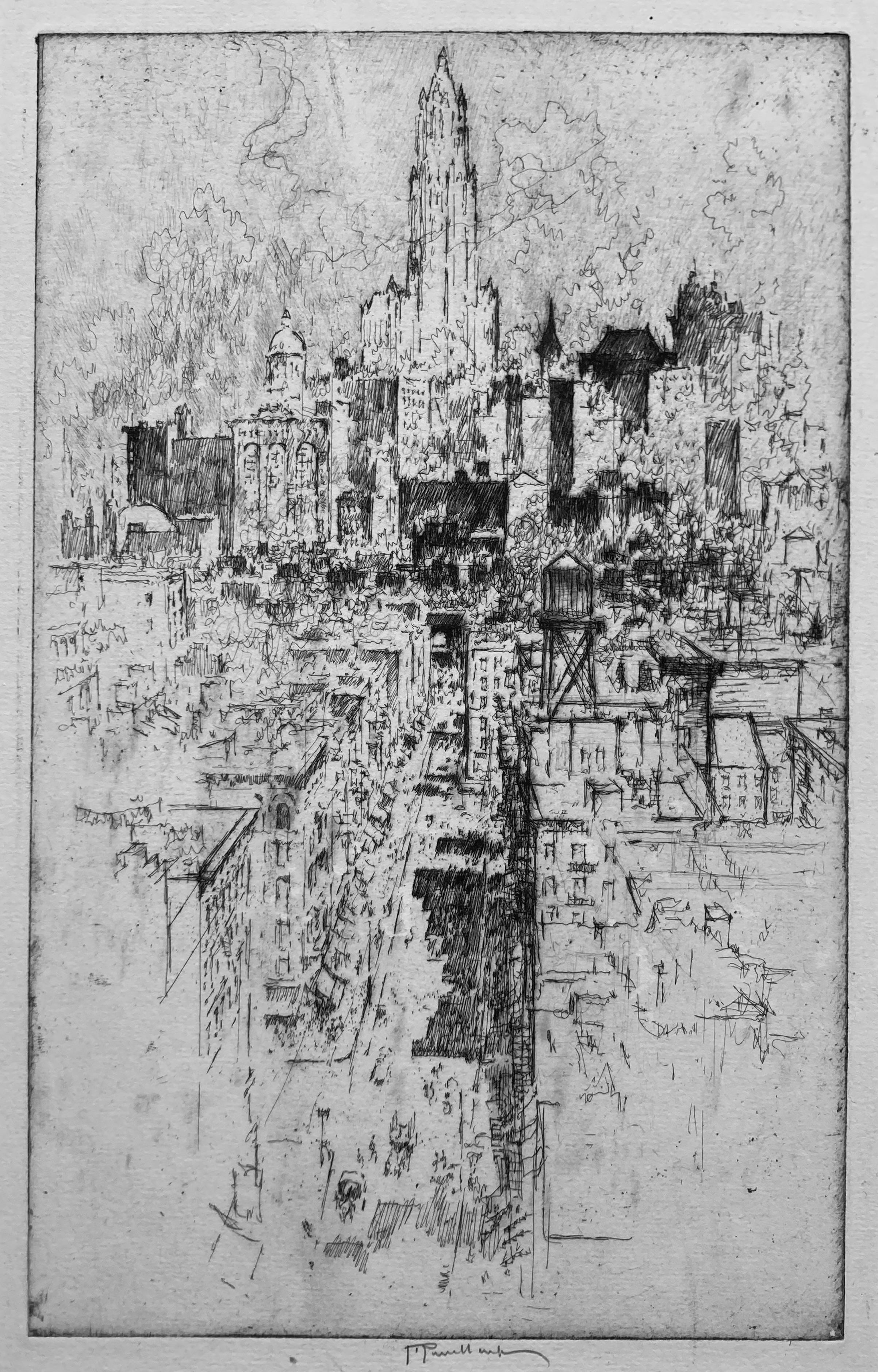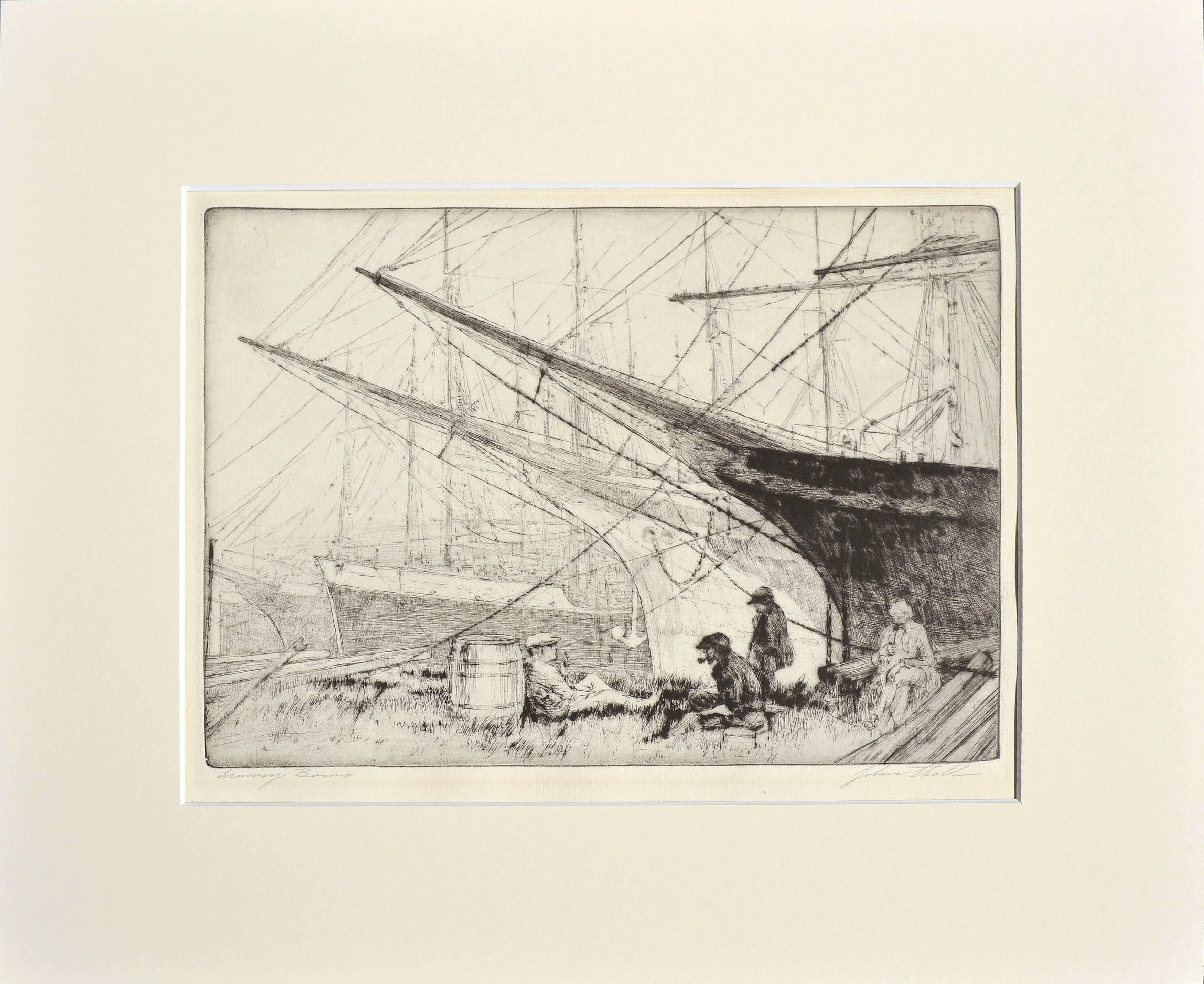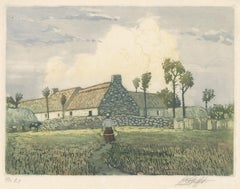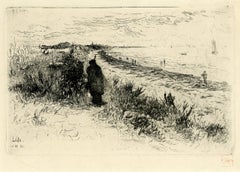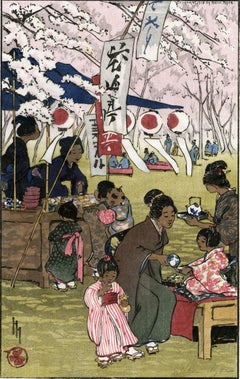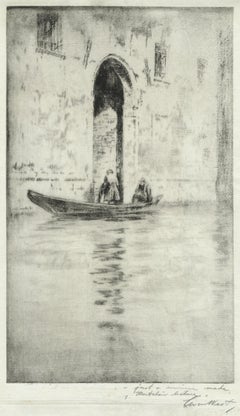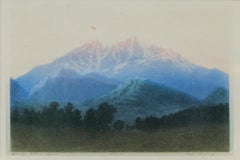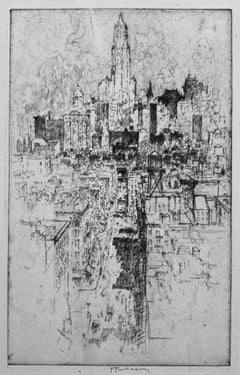Items Similar to Desolation, S.C. or Deserted Cabins, Beauford, S.C.
Want more images or videos?
Request additional images or videos from the seller
1 of 7
Louis Oscar GriffithDesolation, S.C. or Deserted Cabins, Beauford, S.C.c. 1930
c. 1930
About the Item
Desolation, S.C. or Deserted Cabins, Beauford, S.C.
Etching & Aquatint, c. 1930
Signed by the artist in pencil lower right (see photo)
Annotated "Trial Proof" in pencil lower left corner of sheet
Provenance: Estate of the artist
By decent
Note: An impression of this image is in the collection of the Greenville County Museum of Art, Greenville, South Carolina
Condition: Excellent
Plate/Image size: 8 x 9 3/4 inches
Sheet size: 12 7/8 x 15 inches
Louis Oscar Griffith
(1875-1956)
Born in Greencastle, Indiana, Griffith grew up in Dallas, Texas where Texas artist and teacher Charles Franklin Reaugh recognized young “Griff’s” artistic talent. At age 18, Griffith moved to St. Louis where he attended the St. Louis School of Fine Arts.
In 1895, he moved to Chicago where he worked making color prints for the firm Barnes and Crosby. He attended the Art Institute of Chicago and during a brief stay in New York, the National Academy of Design. A successful commercial artist with a studio in the Chicago Loop, Griffith was a member and president of the Chicago Palette and Chisel Club.
He made his first trip to Brown County, Indiana in 1908, intrigued by reports of beautiful scenery by other Chicago-area artists such as Adolph Shultz and woodblock print-maker Gustave Baumann.
Griffith’s first exhibition was in 1903 at the Art Institute of Chicago, which by 1824 exhibited more than 60 of his works. He showed almost 70 works at the annual Hossier Salon Exhibition.
He won a bronze medal at the Panama-Pacific International Exposition in San Francisco in 1915; in 1921, he was a gold medalist at the Palette and Chisel Club; he won the Daughters of Indiana prize in 1925. The Chicago Society of Etchers recognized his works in 1949 and 1953; an oil, A Tranquil Afternoon, was awarded the Davis Wild Flower and Landscape prize in San Antonio, Texas.
The Smithsonian Institution in Washington mounted a special exhibit of Griffith’s prints in 1945. He also exhibited at the 1921 show of the Pennsylvania Academy of Fine Arts; the 1926 Sesquicentennial Exposition in Philadelphia; the 1927 second International Exhibition of Modern Engravings in Florence, Italy; the Canadian National Exposition; National Academy of Design in 1943; and the Library of Congress, also in 1943.
- Creator:Louis Oscar Griffith (1875-1956, American)
- Creation Year:c. 1930
- Dimensions:Height: 8 in (20.32 cm)Width: 9.75 in (24.77 cm)
- Medium:
- Movement & Style:
- Period:
- Condition:
- Gallery Location:Fairlawn, OH
- Reference Number:Seller: FA65461stDibs: LU14015018802
About the Seller
5.0
Recognized Seller
These prestigious sellers are industry leaders and represent the highest echelon for item quality and design.
Platinum Seller
Premium sellers with a 4.7+ rating and 24-hour response times
Established in 1978
1stDibs seller since 2013
784 sales on 1stDibs
Typical response time: 1 hour
Associations
International Fine Print Dealers Association
- ShippingRetrieving quote...Shipping from: Akron, OH
- Return Policy
Authenticity Guarantee
In the unlikely event there’s an issue with an item’s authenticity, contact us within 1 year for a full refund. DetailsMoney-Back Guarantee
If your item is not as described, is damaged in transit, or does not arrive, contact us within 7 days for a full refund. Details24-Hour Cancellation
You have a 24-hour grace period in which to reconsider your purchase, with no questions asked.Vetted Professional Sellers
Our world-class sellers must adhere to strict standards for service and quality, maintaining the integrity of our listings.Price-Match Guarantee
If you find that a seller listed the same item for a lower price elsewhere, we’ll match it.Trusted Global Delivery
Our best-in-class carrier network provides specialized shipping options worldwide, including custom delivery.More From This Seller
View AllBrittany Landscape with Figure
By Louis Oscar Griffith
Located in Fairlawn, OH
Brittany Landscape with Figure
Etching & color aquatint, c. 1920
Signed lower right (see photo)
Numbered lower left: "No. 21" (see photo)
An early color etching by the artist, based ...
Category
1920s American Impressionist Landscape Prints
Materials
Aquatint
Lido (Venice)
By Otto Henry Bacher
Located in Fairlawn, OH
Lido (Venice)
Etching on chine collee, 1880
Part of the artist's "Venice Set"
Signed upper right in plate :Otto H Bacher" (see photo)
Signed with the estate stamp, Lugt 2002 recto lower right beneath image. (see photo)
Created October 20, 1880
Reference: Andrew Venice No. 29
Provenance: Estate of the Artist
Otto H. Bacher (1856-1909)
Otto Henry Bacher was born in Cleveland, Ohio, to a family of German descent. He first studied art at the age of sixteen with local genre trompe l'oeil still-life artist, DeScott Evans. Although he studied with Evans for less than one year, Bacher's early work, comprised mainly of still lifes, betrays Evans's influence. After a short period in Philadelphia, where he studied at the Pennsylvania Academy of the Fine Arts, Bacher returned to Cleveland and met Willis Seaver Adams, an artist from Springfield, Massachusetts, who had just recently arrived upon the Cleveland art scene. Soon the two artists were rooming together. Adams was instrumental in the founding of the Cleveland Art Club, as well as the establishment of the Cleveland Academy of the Fine Arts, to the board of which Adams had Bacher appointed. Also during this time, Bacher began to learn the process of etching from local etcher and landscape painter Sion Longley Wenban.
In 1878, Bacher and Adams left for Europe. After stopping briefly in Scotland, Bacher went on to Munich, where he enrolled at the Royal Academy. He quickly tired of the rigors of the academy, and soon he was studying with Cincinnati artist Frank Duveneck, the prime American exponent of the Munich School. In 1879, Bacher made a trip to Florence with Duveneck as one of the celebrated "Duveneck Boys." Early the following year, the group proceeded to Venice, where Bacher and several other artists established studios in the Casa Jankovitz.
By this time an avid printmaker, Bacher had his etching press sent from Muni ch, and it was in his Venice studio that he taught Duveneck the rudiments of etching. Soon Bacher, Duveneck, and other members of the Duveneck circle were experimenting in printmaking. Among the group's contributions were some of the first American examples of monotypes, which they called "Bachertypes" because they were printed using Bacher's press.
It was also in Venice that Bacher met the venerable American expatriate artist, James McNeill Whistler. On learning of Bacher's press and his collection of etchings by Rembrandt, Whistler made himself a regular visitor to Bacher's studio, and he eventually took his own room in the Casa Jankovitz. Bacher spent much of the rest of 1880 with Whistler, the two artists sharing etching techniques. From Whistler, Bacher learned tone and line graduation; from Bacher, Whistler learned his etching techniques, including better ways of using the acid bath which produced less tedious and more efficient work. Bacher visited Whistler occasionally in the years that followed, and in 1908 he published With Whistler in Venice, his famous recollections of his time with the great artist.
Bacher spent the next two years traveling extensively throughout Italy, with Venice as the center of his operations, and he produced a number of important etchings of Italian subjects. Bacher sent several of these works to America in 1881 to be included in the Society of American artists exhibition that year, and had a similar group of works shown at the Royal Society of Painter-Etchers' first exhibition at the Hanover Gallery in London. Following the exhibition, Bacher, along with several other of the American contributors, was elected a Fellow of the Society. Bacher collected twelve of his etchings of Venetian subjects and sold them in bound volumes through his New York dealer, Frederick Keppel.
Bacher returned to Cleveland in January 1883 as a fully cosmopolitan artist. He set up a lavish studio furnished with exotic items and objets-d'art he had collected on his travels, and began to hold art classes as a means to supplement his income. He soon joined with Joseph De Camp in forming a summer sketch class in Richfield, Ohio. Bacher and De Camp also planned the Cleveland Room for a major loan exhibition in Detroit that year. During this period, Bacher increasingly painted in oil, and he began to produce sun-dappled canvases in an impressionistic mode.
Unable to sell any paintings from this early period, however, Bacher left Cleveland for Paris in 1885, where he planned to undertake further studies. Stopping first in London to visit Whistler, Bacher stayed only briefly in Paris before heading to Venice, where he spent the remainder of the year. In January 1886, Bacher returned to Paris and enrolled at the Académie Julian, and also entered the atelier of Emile-Auguste Carolus-Duran. The life of the student seems never to have suited Bacher, as he stayed in Paris only through June, before departing again for Venice. For the next six months he, Robert Blum, and Charles Ulrich...
Category
1880s American Impressionist Prints and Multiples
Materials
Etching
Blossom Time in Tokyo
By Helen Hyde
Located in Fairlawn, OH
Blossom Time in Tokyo
Color woodcut, 1914
Signed by the artist in pencil on the image (see photo)
Signed in the block with the artist red stamp and her initials (see photo)
Condition...
Category
1910s American Impressionist Figurative Prints
Materials
Woodcut
Untitled (Venice canal, man departing the gondola)
By Levon West
Located in Fairlawn, OH
Untitled (Venice canal, man departing the gondola)
Drypoint, c. 1930-1931
Signed in pencil lower right (see photo)
Annotated in the lower margin:
"Just a souvenir made ___ Monclair L...
Category
1930s American Impressionist Landscape Prints
Materials
Drypoint
Old Houses in Amsterdam
By T.F. Simon
Located in Fairlawn, OH
Old Houses in Amsterdam
Drypoint, 1909
Signed and dedicated in pencil lower right.
"A Mr. H. A. Webster, bien sympathiquement, T.F. Simon, Paris 26/10"
Simon...
Category
Early 1900s American Impressionist Prints and Multiples
Materials
Drypoint
New York Bouquet
By Childe Hassam
Located in Fairlawn, OH
New York Bouquet
Lithograph, 1917
Edition: 93
Signed with the artist's cipher in pencil lower right (see photo)
This lithograph is inspired by Hassam's oil painting of the same title...
Category
1910s American Impressionist Landscape Prints
Materials
Lithograph
You May Also Like
Bayfront Park, Miami, Florida
By David Rosenthal
Located in San Francisco, CA
Artist: David Rosenthal (American 1876-1949)
Title: Bayfront Park, Miami Florida
Year: c.1940
Medium: Color Etching with aquatint
Image (Plate mark) size: 9 x 11 inches
Sheet size: 10 x 12.25 inches
Signature: Hand signed, titled and numbered 6/150 in pencil by the artist
Condition: Very good, margin slightly toned by age
About the artist.
David Rosenthal (1876-1949) was a Cincinnati artist...
Category
Early 20th Century American Impressionist Landscape Prints
Materials
Aquatint, Etching
Village in France
By David Rosenthal
Located in San Francisco, CA
Artist: David Rosenthal (American 1876-1949)
Title: Village in France
Year: c.1927
Medium: Color Etching with aquatint
Image (Plate mark) size: 13.5 x 10 inches
Sheet size: 14.75 x 11.25 inches
Signature: Hand signed and numbered 9/50 in black ink by the artist
Condition: Very good, margin slightly toned by age
About the artist.
David Rosenthal (1876-1949) was a Cincinnati artist...
Category
Early 20th Century American Impressionist Landscape Prints
Materials
Etching, Aquatint
Longs Peak, Estes Park, Colorado, No. 2, Original 1920s Aquatint
By George Elbert Burr
Located in Denver, CO
This original vintage color aquatint etching captures the breathtaking beauty of Longs Peak and Mount Meeker, as seen from Rocky Mountain National Park near Estes Park, Colorado. Cre...
Category
1920s American Impressionist Landscape Prints
Materials
Aquatint
UP TO THE WOOLWORTH
By Joseph Pennell
Located in Santa Monica, CA
JOSEPH PENNELL (1857- 1926)
UP TO THE WOOLWORTH 1915 (Wuerth 673)
Etching, signed in pencil. Early state before additional work, especially before extensive darkening in the sky. I...
Category
1910s American Impressionist Landscape Prints
Materials
Etching
"Drowsy Bums" - Mid Century Figurative San Francisco Dock Landscape
By John Stoll
Located in Soquel, CA
Figurative landscape capturing dock workers' afternoon break by John Theodore Edward Stoll (b. Germany; 1889, d. California; 1974). Signed "John Stoll" lower right. Titled "Drowsy Bu...
Category
1940s American Impressionist Landscape Prints
Materials
Paper, Printer's Ink, Etching
Landscape with Horses.
By James Abbott McNeill Whistler
Located in Storrs, CT
Kennedy catalog 36 state ii; Glasgow 45 state ii. Image: 4 7/8 x 7 3/4 (sheet 6 7/8 x 9 5/8).The Glasgow catalog records 32 known impressions. A scarce early etching -- there was no ...
Category
Mid-19th Century American Impressionist Landscape Prints
Materials
Drypoint, Etching
$3,000 Sale Price
36% Off
